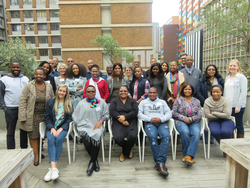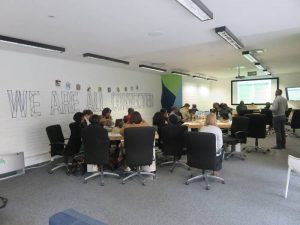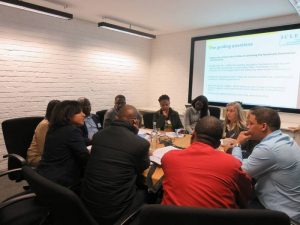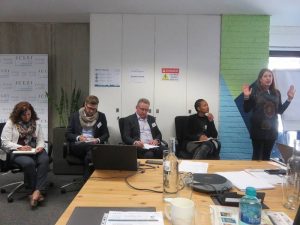
High level group to guide and support Urban-LEDS II project in South Africa
June 27, 2018
National workshop debates alternatives to implement LEDS in Brazilian cities
July 10, 2018and co-hosts event on financing solutions for climate action in cities. On 29 May 2018, the Urban LEDS-II Summit, held in Gauteng, brought Urban-LEDS project cities from South Africa together to share the various challenges their cities face in relation to climate change, as well as the opportunities in addressing these challenges, in a peer-to-peer exchange.

The Urban-LEDS project, funded by the European Commission, and implemented by UN-Habitat and ICLEI, aims to enhance the transition to low emission, green and inclusive urban development in emerging economy countries. Under the Urban-LEDS I project (2012-2015), ICLEI and UN-Habitat guided and supported eight model cities in South Africa to develop comprehensive Urban Low Emission Development Strategies (Urban LEDS) and action plans using ICLEI’s GreenClimateCities process methodology.
The second phase of this flagship project, “Accelerating climate action through the promotion of Urban Low Emission Development Strategies”, or “Urban-LEDS II” for short, is being implemented from 2017 to 2021. Not only does this exciting new phase include the expansion of the project to new countries, such as Rwanda, but it also continues to contribute to the reduction of greenhouse gas emissions and improved climate resilience in South Africa’s project municipalities.

The Urban-LEDS II project cities in South Africa include: Steve Tshwete Local Municipality; Kwa Dukuza Local Municipality; Mogale City Local Municipality; Nelson Mandela Bay Metropolitan Municipality; Saldanha Bay Local Municipality; Sol Plaatje Local Municipality and uMhlathuze Local Municipality.
The discussions held provided the cities the opportunity to share and find commonalities about their successes, challenges and current climate actions, and to learn from one another.
A Cities and Regions Talanoa Dialogue was held at the Urban-LEDS ll Summit. Here the South African Urban-LEDS ll cities were able to share their experiences and knowledge about South Africa’s Nationally Determined Contributions (NDCs) and Monitoring, Reporting and Valuation System (MRV). This dialogue had a specific focus on the role of local government and how municipalities can be included in these processes to a greater extent.

Following directly after the Urban-LEDS ll Summit, ICLEI Africa and the World Wide Fund for Nature South Africa (WWF-SA) hosted a 2-day event in Gauteng on Financing the future we want: Financing solutions for climate action in cities. In addition to having the Urban-LEDS II project cities from South Africa there, the event was well attended by representatives from a number of companies and organisations including United Nations Environment; South African Local Government Association (SALGA); South African Cities Network (SACN); Cities Support Programme (CSP) at National Treasury; Ashburton Private Equity Fund; Nedbank; C40 Cities Climate Leadership Group; Department of Corporate Affairs (DCOG); Department of Environmental Affairs (DEA); City of Johannesburg; City of Tshwane; City of Cape Town; and the International Institute for Sustainable Development (IISD).
This event was organised to meet the need for capacity building in local government on financing, as well as to allow public and private sector representatives to meet and learn more about each other’s needs. Fiscal policy lies at the heart of creating an enabling environment for embracing sustainability and climate resilient development. This is further supported through the Integrated Urban Development Framework (IUDF), which identifies sustainable finances as the ninth policy lever to achieve the desired urban form in South African cities. Often, the financing of projects and municipal finances is seen as a barrier to implementing innovative solutions and climate resilient development in municipalities throughout South Africa; as experienced in the work of both WWF South Africa and ICLEI Africa.

Municipal revenue in South Africa is generated through a range of sources including intergovernmental transfer payments, national grants, subsidies, rates and taxes, and the sale of electricity and water. Other than some metropolitan municipalities, secondary cities are largely dependent on these sources of income. This is a concern for many municipalities in the current context of increased resource insecurity and fiscal constraints.
Additional funding is difficult to obtain as very few municipalities are able to raise their own financing. This is due to poor credit ratings, high levels of perceived risk by financial institutions, a lack of technical knowledge on the complexities of these finance mechanisms, as well as limited internal capacity to develop “bankable” projects. In a context of climate change, municipalities can expect to receive far lower incomes from the sale of electricity and water. This is due to a complex combination of factors: residents and businesses are reducing their resource use as energy efficiencies rise, along with forced reductions in resource consumption due to limited availability, such as during droughts, and making use of increasingly accessible off-grid technology.
It is against this background that ICLEI Africa and WWF South Africa partnered to host this event, with the purpose of providing municipalities with an overview of opportunities and tools for financing climate projects, innovative municipal financing and practical guidance to access these.
The Urban-LEDS II project cities were able to learn more about what alternative financing options and platforms are available for climate mitigation and adaptation projects. This will support the implementation of low emission development strategies and actions for improved climate resilience in South Africa’s secondary cities.
